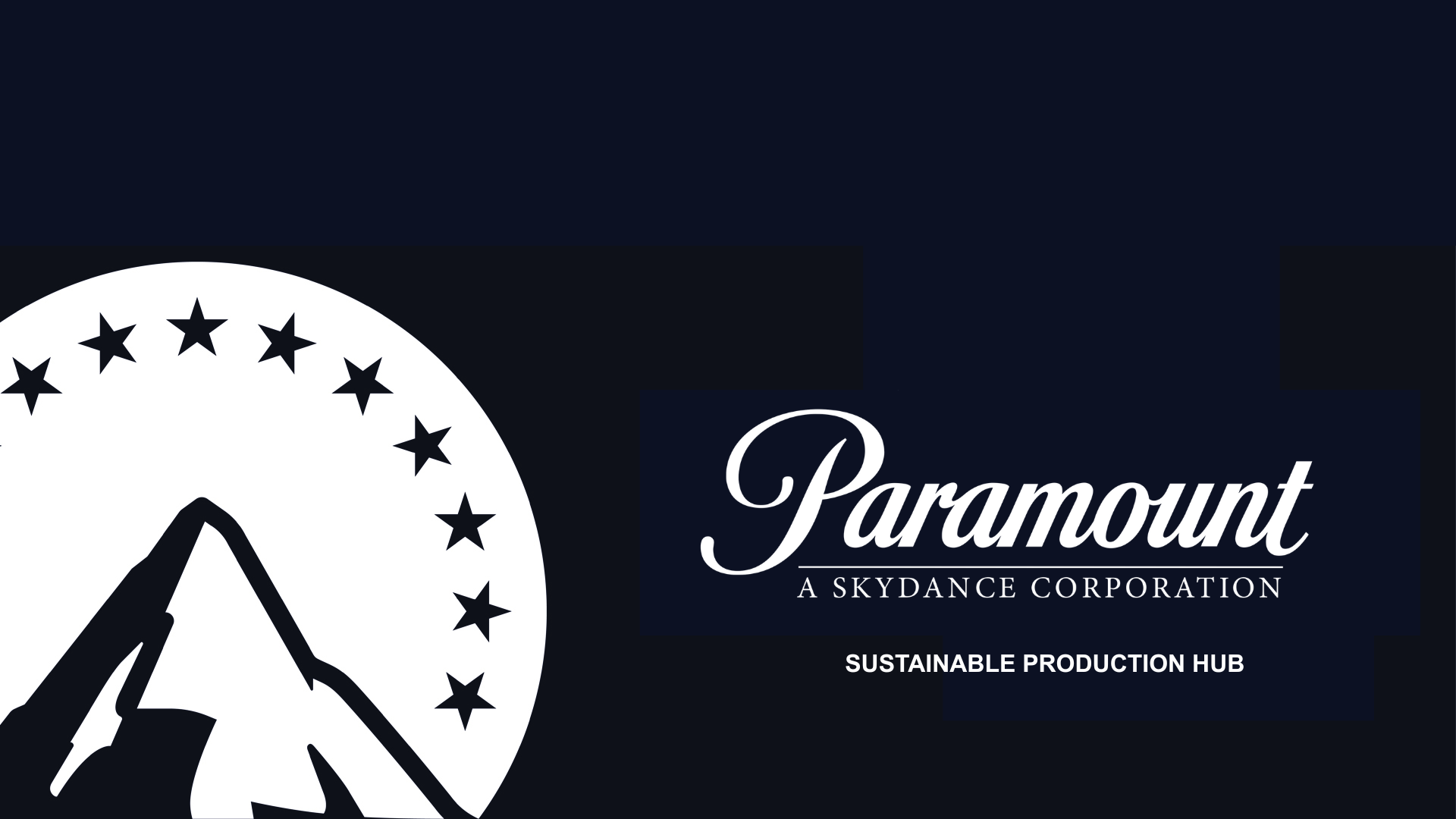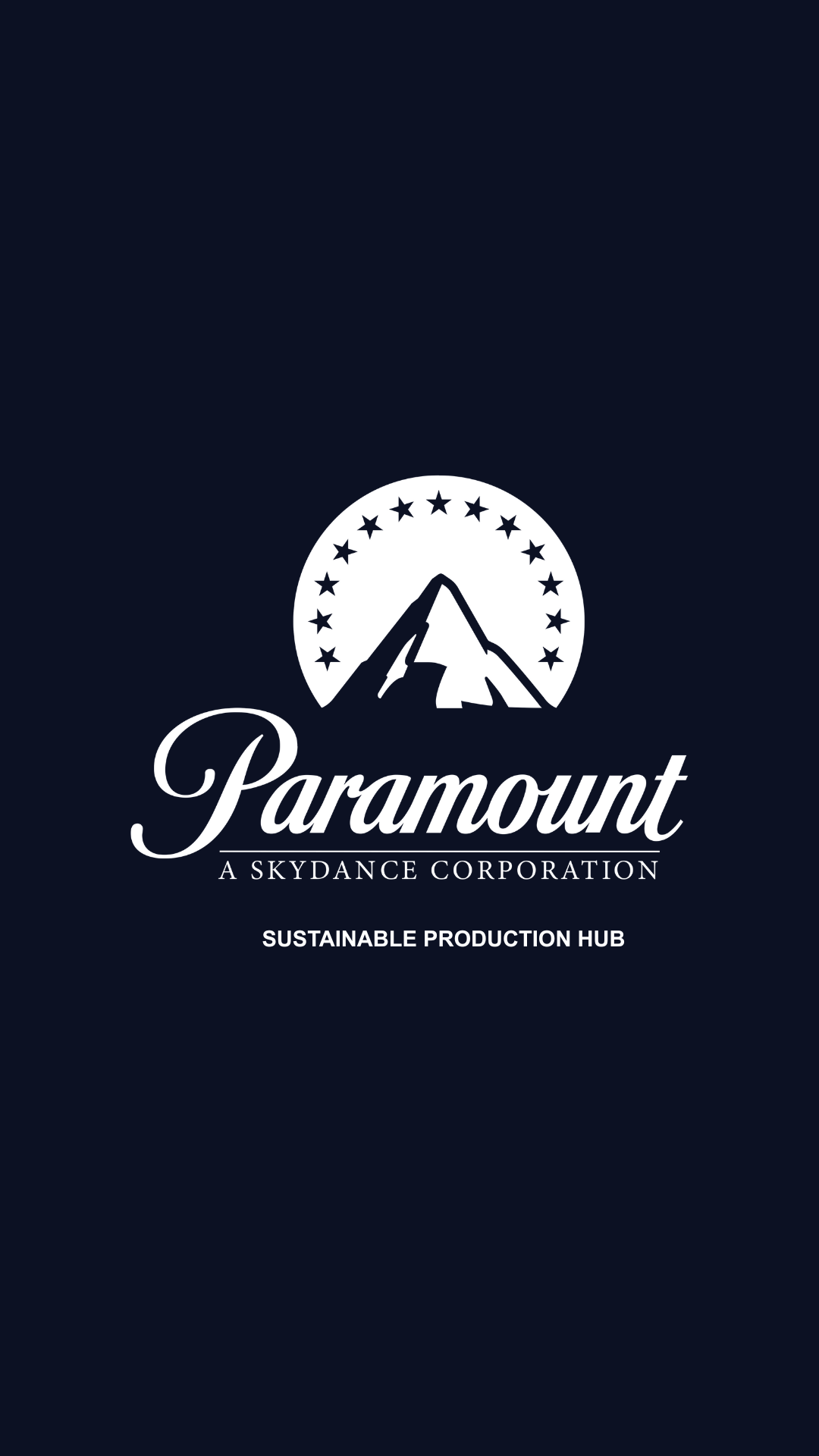Welcome to the Sustainable Production Hub
A Paramount Skydance resource to support your production's sustainability initiatives
On set and on screen, Paramount aims to reduce the environmental impact of our productions and deliver content that inspires sustainable action. By championing sustainable practices, we safeguard the well-being of our crew, optimize our operations and ensure the longevity of our business. We encourage each production to adopt sustainable initiatives and workflows that fit into its day-to-day operations.
The guidelines below apply to all Paramount productions. Please note some Paramount brands have tailored guidelines and documents that should be prioritized when working on one of their productions.
The guidelines below apply to all Paramount productions.
- Fill out this survey and let us know you're considering sustainability for your production. We'll be in touch to provide support along the way.
- Schedule a sustainability kick-off meeting with your brand's sustainability representative and the Physical Production office. Not sure who your brand's rep is? Reach out to SustainbleProduction@Paramount.com and we'll help.
- Download the PEACH and PEAR spreadsheet tools. If your production will use Lauan/Meranti plywood, download the PLUM as well. Familiarize yourself with the tools and ensure there is a plan in place to populate it at the appropriate times during production.
- Hire a sustainability representative, often called an "eco PA" or "sustainability coordinator," to manage sustainability initiatives and data collection for the production. Visit Find a Vendor to get a quote.
- Contact Rock and Wrap It Up to implement food and material donation plans.
- Set the tone for a commitment to sustainability throughout Production. Visit Find a Vendor for information and tools on how and what to share with the crew.
- Consult your creative executive and a climate storytelling consultant to seamlessly and appropriately weave sustainability themes into your script. Reach out to one of the partners in Find a Vendor or contact SustainableProduction@Paramount.com for more on this.
- Complete and submit the Production Environmental Actions Checklist (PEACH). The PEACH is a checklist of best practices by production department. Send it to SustainableProduction@Paramount.com when you're done.
- Complete and submit the Production Environmental Accounting Report (PEAR). The PEAR is the industry standard to measure a production's carbon footprint. Send it to SustainableProduction@Paramount.com when you're done.
- Complete and submit the Production Lumber Material Worksheet (PLUM). The PLUM is a tool for tracking a production's lumber usage and ensuring the production is using responsibly sourced (i.e., sustainably harvested, recycled, reclaimed, or reused) lumber. Send it to SustainableProduction@Paramount.com when you're done.
- At wrap, please email the completed PEACH, PEAR, and PLUM documents to the Environmental Media Association. Copy SustainableProduction@Paramount.com and your brand-specific sustainability representative, if you have one, on the email.
- If the documents were not completed, please email a brief statement summarizing the reasoning, as well as any partially completed documents, to SustainableProduction@Paramount.com and copy your brand-specific sustainability rep.
PEACH, PEAR, & PLUM
Before you start anywhere else, start with these tools.
The PEACH, PEAR, and PLUM are three individual tools designed to benchmark and measure a production's sustainability program. The North American standard for sustainable productions, these tools provide comprehensive metrics and insights to assess environmental impact and drive progress.
Outside the U.S.? Learn about international sustainability programs here.
-
PEACH
The PEACH is a sustainable production practices checklist in Excel. It is organized by department and was originally designed for scripted content but can be adapted for other genres. The document is completed by the sustainability coordinator or production coordinator twice: at prep, and at wrap. It is then e-mailed to sustainableproduction[at]paramount.com.
-
PEAR
The PEAR is a carbon emissions calculator in Excel. It is appropriate for all types of production. Its data typically comes from the Accounting Department or vendors. The PEAR is implemented over the course of production, completed at wrap, and e-mailed in an excel format to sustainableproduction[at]paramount.com.
-
PLUM
The PLUM is a lumber materials spreadsheet. It is only for productions using Lauan/Meranti plywood and their alternatives (like RevolutionPly). A department head or sustainability coordinator should fill out the spreadsheet whenever this lumber is purchased and e-mail the completed spreadsheet to sustainableproduction[at]paramount.com.
Find a Vendor
A sustainability representative, often called an "eco PA," can support the implementation of the sustainable program on set; oversee the management and completion of the PEACH, PEAR, and PLUM; engage with sustainable vendors; facilitate donations; draft communications; and make it easy for productions to achieve their sustainability goals.
Consider sourcing an eco PA from one of these organizations. Reach out during pre-production to receive a quote, and please make sure to copy SustainableProduction@Paramount.com on your email.
Unused food and materials don't have to go to waste -- they can go to those in need. For U.S. production, connect the catering department with Rock and Wrap It Up (RWU) to donate leftover meals and ingredients, free of charge. RWU also supports productions with storage clearouts and asset donations. Reach out to Amy Reiley at RWU to get yoru food and material donation program started.
Additional food donation organizations:
-
Every Day Action (Los Angeles)
-
Rock Can Roll (U.S.-wide)
-
Goodr (Atlanta)
-
City Harvest UK (London)
-
Second Harvest (Ontario)
Every department and crew member can make a positive impact on the production's sustainability program. Set the tone of this commitment to sustainability in pre-production so the crew is aware and can participate starting Day 1.
- Memos, graphics, and fact sheets can be found in the Sustainable Entertainment Alliance Toolkit.
- Post signage where compost, paper recycling, plastic recycling, etc. is being collected on state or at location.
- Send a sustainability memo to everyone working on the production before Day 1 of shooting, highlighting sustainable initiatives and communicating sustainability goals, such as a BYOWB (bring your own water bottle) policy
- Is production piloting any sustainability initiatives? Send a memo to crew highlighting any efforts that may go unnoticed to celebrate those wins (e.g., In Episode 1, we donated 50 pounds of food to a local shelter thanks to our partnership with RWU.)
Set an intention with show writers and the props department to eliminate single-use plastic seen on screen.
- Lights, Camera, Plastic? is a resource, as is this PDF for suggestions on sustainable swaps.
Work with your head chef to implement more responsible dining choices.
- Consider implementing a Meatless Monday initiative in which, once a week, catering omits red meat (beef and pork) in favor of plant proteins. Not only does this initiative reduce the carbon emissions generated by a production, but doing so can boost crew health (and save money).
Climate storytelling can be active or passive, explicit or implicit. It can be a documentary about a climate disaster, or it can mean swapping out a standard car for an EV on screen. There are tools available to help you embed appropriate themes into your production, starting with:
Did you incorporate a sustainable production practice into your production? Tell us about it, or reach out with a question.

